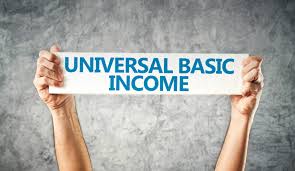
Universal basic income is in news these days.
The economists and policymakers from across the world have been debating the concept of universal basic income (UBI).
The idea of UBI was originally proposed as a solution to high inequality and job loss caused by increased automation in the developed countries. Finland launched a 2-year pilot study in January 2017 to test the feasibility of universal basic income.
UBI is discussed in India as well, for its potential to combat poverty.
The Chief Economic Advisor, Arvind Subramaniam, devoted a chapter in the Economic Survey 2016-17 to ‘Universal Basic Income’.
The International Monetary Fund also backed the idea in its recent Fiscal Monitor Report. It said- UBI is a powerful instrument for combating poverty and extreme poverty.
A pilot study on UBI was conducted by UNICEF and Self Employed Women’s Association (SEWA) in Madhya Pradesh in 2011. The study yielded positive results.
What is Universal Basic Income?
Universal basic income is a state paying everybody a uniform amount of money regardless of their income, employment status, socioeconomic status etc. UBI has three components:
- Universality- It is paid to everyone. However, Arvind Subramaniam proposed to cover 75 % of India’s population in the Economic survey.
- Unconditionality- There are no conditions like employment status etc. attached to the transfer of money.
- Agency- It gives greater agency to the beneficiaries. They can decide how to spend the money. It empowers people to make their own decisions. It does away with the paternalistic attitude of the state.
About 22% of India’s population lives below the poverty line. The Economic survey estimates that if the Government pays Rs.7620 to every Indian citizen in 2016-17, it will cut poverty from 22% to 0.45%.
The survey mentions that UBI is more feasible in India because it can be pegged at relatively low levels of income and still yield immense welfare gains.
The Budget for 2016-17 indicates that there are about 950 central Government welfare scheme in India. These schemes account for about 5.2 percent of the GDP by budget allocation.
Many of these subsidies benefit the rich more than poor. As per the calculations by Mint– 91 % of the subsidies allocated by the Government for LPG, benefits the non-poor. The figure is 49 % for Kerosene, 77.42% for electricity and 85 % for Railways. Thus, the money spent in the name of the poor actually benefit the non-poor.
There is exclusion error as well. An estimate from 2011-12 suggests that 40 percent of the poor are excluded from the PDS scheme. The corresponding figure for 2011-12 for MGNREGS was 65 percent.
The UBI will solve the problem of poor targeting and exclusion, as it is universal and unconditional.
As the survey puts it- UBS requires that every person should have a right to a basic income to cover their needs, just by virtue of being citizens. Anyone who is an Indian citizen is an intended beneficiary.
It will do away with the need to distinguish between poor and non-poor, to identify the intended beneficiaries.
UBI will obviate the need for complex layers of bureaucracy designed to deliver subsidies and save considerable time and resources.
It will also plug leakages in the subsidy delivery system by transferring the basic income directly into the bank account of the citizens.
This unconditional direct benefit transfers (DBT) can be administered through the JAM trinity. JAM stands for Jan Dhan Accounts, Aadhar and Mobile.
(Read: Pradhan Mantri Jan Dhan Yojana & Aadhar Card Explained)
In spite of the above, analysts have been sceptical that men will fritter away their basic income in alcohol and gambling. This can be addressed by transferring money to women. Women are more likely to spend on their family’s welfare.
As per the pilot study conducted in Madhya Pradesh, villages spent more on healthcare and education and their over-all welfare improved after receiving the basic income.
Is there any argument against Universal Basic Income?
The Univeral Basic Income is conceptually appealing. But, it can lead to various distortions in the market. There are other challenges as well:
- UBI was proposed as a solution to job loss caused by increased automation in the developed world. It is not a good idea for a developing country like India. The Government has already initiated direct cash transfers and rolled out Aadhar to root out leakages in the subsidy delivery mechanism. It should utilise the savings to spend more on education and healthcare for the masses. India should focus on higher economic growth to pull the masses out of poverty.
- UBI can reduce incentives for people to work and lead to lower participation in the labour market. It can also increase wages. This happened after the implementation of MNREGA. MNREGA led to an increase in wages without a commensurate increase in productivity. This led to high inflation and low productivity. Low productivity affects India’s competitiveness in the world market.
- If UBI turns out to be a failure, it will be impossible to reverse the policy. In fact, it will become a rallying point for elections. People will demand the UBI amount to be increased and political parties will comply willingly with the hope of coming to power. It will impose a huge fiscal burden and strain our finances.
- It is not possible to implement UBI from a political point of view. For UBI to be fiscally affordable, it will have to replace the existing welfare scheme which accounts for 5.1 % of GDP. But, people will be not willing to give up benefits in favour of a basic income for all. Even Arun Jaitley acknowledged that UBI is not politically feasible.
To conclude, Universal Basic Income is a radical proposition. The policymakers should undertake a careful cost-benefit analysis before implementing it.
If you enjoyed this post, please comment and share.
This topic was suggested to us on our Contact/ Suggest a topic page
References:
Economic Survey